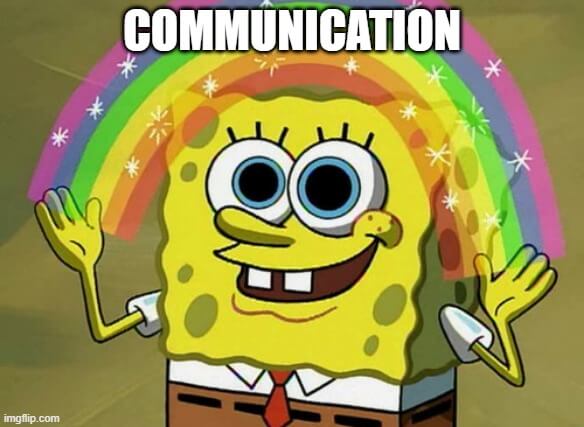“Teamwork begins by building trust. And the only way to do that is to overcome our need for invulnerability.”
To break down these consequential words by Patrick Lencioni– most people are reluctant communicators as they feel the “need for invulnerability”.
Vulnerability is the position of “being open to attack or damage”. Or, in more simple words, being able to be easily hurt, influenced, or attacked. Invulnerability, being the exact opposite.
Teamwork requires trust, and trust can only be achieved when people’s fear of vulnerability is eliminated from the picture. And, only sincere communication can help people feel protected.

And now, give THIS a read!👇
- Even though 89% of people believe that effective communication is extremely important, 8 out of 10 people rate their own business’ communication as either average or poor!
- Now, this takes us to the next fact that says 86% of employees and executives cite the lack of effective communication as the main cause for workplace failures.
- And this takes us to David Grossman’s report on “The cost of poor communications” which included 400 large companies and 100,00 employees. As per the report, the cost of communication barriers that arise in the workplace stands at $62.4 million per year, per company!
Now, let’s study a real-life example that throws light on the importance of communications skills at the workplace.
Table of Contents-
Shut Up and Listen!📣- A Case Study
PayPal

Problem: The digital payment company, PayPal, needed to address an internal survey that indicated not all the company employees were using the app. The President, David Marcus, drafted a company-wide memo to the staff regarding the issue.
Approach: David Marcus took a “megaphone approach” to the matter. He told his staff to either use the product or quit. The memo specifically stated,
“If you are one of the folks who refused to install the PayPal app or if you can’t remember your PayPal password, do yourself a favor, go find something that will connect with your heart and mind elsewhere”.
A much better approach should have been to find out the reason for which the employees weren’t using the payment app, and ask for their suggestions through a proper communication channel.
Outcome: Obviously, the outcomes of such an outrageous approach could not have been extraordinarily amazing. Even worse, the memo was leaked to the press!
This media report generated widespread concern among PayPal customers and left them wondering what was wrong with the app that its staff wouldn’t use it.

Summary: Communication is always a two-way process. When the top management uses the “megaphone approach” to communicate a direction, employees tend to feel disconnected. Their motivation falls as they do not feel like they are a part of the conversation.
To implement effective communication, management must establish a sound internal communication structure that allows the employees to put forward their comments and views on the decision. These suggestions should be listened to and used to implement more inclusive decisions.
10 Importance of Communication Skills | Importance of Communication Skills in Life
“Communication – the human connection – is the key to personal and career success.”
Paul J. Meyer
Personal or professional, communication always holds a huge impact on relationships. While good communication helps strengthen the bonds, poor communication may single-handedly completely destroy the relations.
So, let’s see the importance of communication skills in business!
Keep scrolling.
Importance of Communication Skills in Workplace | Importance of Communication Skills in Business
1. Basis for Decision-making & Planning

Communication is essential to make plans and decisions. Organizations do not run on sole decision-making. It is a group effort and requires the participation of the whole team.
Yes, of course, the top management can think of taking the decisions by themselves, but how will they inform the team about their jobs and responsibilities?
How will they plan the whole strategy without getting into account each of its team members’ USPs?
All of this requires communication! Through communication problems are brought into the light, plans are made to tackle the issues, and efforts are implemented to overcome the situations.
2. Mitigates Conflicts & Improves Managerial Efficiency
Communication helps resolve conflicts, both internal and external. Whenever team members have conflicting opinions, a manager, using his communication skills, handles the situation.
Without proper communication, conflicts will only invigorate.
Even when there is a conflict with a client, only communication can help resolve them. Now, as the conflicts are resolved with minimal damage, it consequently improves a manager’s efficiency.
3. Increases Employee Engagement & Coordination

Without proper communication, you can turn even the brightest members of your team into “Yes Boss” employees. To avoid this situation, a manager must involve its employees in the decision-making process.
When the employees are engaged in the core tasks, they feel motivated and valued. Thus, increasing their productivity and contribution.
Moreover, when decisions are transparent, coordination is easy. Free-flowing information helps to eliminate confusion.
4. Communication Promotes Cooperation & Peace
As I said earlier, communication helps manage conflicts peacefully. People are easily able to tackle their misunderstandings when they talk openly.
Also, instead of getting into office politics, people rather cooperate with each other. Many problems are solved through group efforts which induce peace and harmony in an organization.
5. Helps Bringing in More Talented & Productive Workforce

An organization can hire much more talented candidates who are perfect for the job if it communicates the job description and company profile properly.
Additionally, HR executives who try to engage with the interviewers get to know them well. This way they know which candidate perfectly hits all the points in their checklist and are able to find the right fit for the job.
Also, the interview says a lot about both- the organization and the interviewee. A well-communicated interview sets the tone for the job.
6. Effective Communication Facilitates Trust
Like I said earlier, communication is the basis of trust. It removes the element of fear and hesitation. This way employees can open up to their seniors and discuss their issues freely.
Further, when the seniors try to resolve these issues or offer to help, they set the right foot for the communication to build the foundation of trust.
Once trust is established between an employer and employee, the overall productivity and efficiency of an organization increases. Moreover, it helps in establishing personal relations within the organization and creating an informal communication structure.
7. Better Relationships with Clients or Colleagues or Employees

“I think for any relationship to be successful, there needs to be loving communication, appreciation, and understanding.”
Miranda Kerr
Whether it’s a personal relationship or a formal relationship, soft and thoughtful communication helps healthify them.
The secret to understanding is communication! In formal settings, it not only allows you to put your point forward but also helps build confidence.
When it comes to better relations with clients, it automatically means better business!
I think all these reasons are sufficient to describe the importance of communication skills in the workplace, right?
Importance of Communication Skills for Students
“Communication is a skill that you can learn. It’s like riding a bicycle or typing. If you’re willing to work at it, you can rapidly improve the quality of every part of your life.”
Brian Tracy
As a student, you constantly need to upskill your profile. Whether these are hard skills or soft life skills- you need to work on them in order to have a successful career. Not just to get admission to a top-tier college or to get a good job, but to improve the quality of your life.
Now, let’s see why communication skills are so important in the life of a student.
8. Networking
This is one of the secrets to success that most successful people won’t tell you. Networking is important for everybody, whether a college student or an employee, or a businessman.
Unlike school, college is not just about the grades. You have to be active in more than just academic domains. And, to be a part of such co-curricular domains you need to build a network. The only way you can skillfully network is by communicating well!
9. Improves Learning

Teachers usually encourage students to ask questions, right? But, why?
Well, this is to establish communication between them and the students. When students ask questions, teachers can analyze whether a topic is clear or not.
Furthermore, asking questions increases students’ learning.
10. Reduced Emotional Stress
When a student is not comfortable asking questions or having doubts in a class, he/she will not be able to get a grip on the subjects. Then they’ll fall behind the rest of their peers. Thus, obviously leading to emotional stress.
Communication skills are very much required for a student to be able to openly express his or her views and problems.
Moreover, these skills will help them get acquainted with their peers and have friendly relations with them.
So, these were some of the reasons demonstrating the importance of communication skills for students.
Now, let’s see how proper communication can lead to conceptualization in organizations. I am going to use a real-life example to illustrate the fact.
So, hold on tight! 👇
Activity Means Nothing Without Results – A Case Study
Nationwide Building Society
Background: The Nationwide Building Society organized an award-winning 5-week BIG Conversation, to gather ideas from all its 18,000 employees company-wide. The aim of this meet was to reinvigorate its sense of purpose.
Approach: The exercise included TalkBack events, online surveys, and a huge listening activity so that the members can contribute their ideas to its future. Nationwide ignited a free-flowing conversation with its workforce through this company-wide internal communications survey.
Outcome: The outcomes of the activity were stupendous. A refreshed strategy and a marketing campaign were devised through a new conceptualization of ‘Building Society, Nationwide’.
Summary: This case study demonstrates the power of active listening and acting on employees’ suggestions.
Such two-way internal communication passages not only lead to employee satisfaction but also induce engagement and productivity. Often such healthy engagement leads to something big, something meaningful- just like in this case!
7 Ways to Communicate Effectively | How to Improve Communication Skills in Workplace?🤔

1. Have Patience
“We never listen when we are eager to speak.”
François de la Rochefoucauld
The first and foremost rule to establish effective communication is to have patience. Usually when in a hurry, we tend to listen to the other person only just to reply- not to understand! This creates a barrier to the transmission of communication. A conversation becomes a monologue.
What basically happens is that instead of two people conversing. You are left with just “two people speaking and none listening”.
To avoid this situation, have patience and wait for the other person to complete. Then, take your time to process the information and then reply, if necessary (I’ll elaborate this under point 7).
Tip💡: If you are in a hurry, try politely asking the other person to have the conversation at a different time so that you can understand it clearly. Trust me, politeness never hurts!
2. Build Trust Through Your Words & ACTIONS
“When the trust account is high, communication is easy, instant, and effective.”
Stephen R. Covey
Trust is the foundation of honest communication. It eases the flow of information from up to down and vice versa. Even though the trust has to be mutual, it has to be laid down by the top management.
Now, establishing trust verbally is a great way to start. But, to make your employees open up, you have to demonstrate this trust through your actions. Try to show interest in your employees’ problems (if they are comfortable with it), empathize with them, and help them resolve their dilemmas.
This way you can prove your trustworthiness to your staff and members.
3. Regular 1:1 Team Meets

E-mails and chats are great! Having an open online tool for internal communication is a great way to improve communication skills in the workplace. This way information can be shared and accessed at any time! Thus eliminating any rigidity.
But, as the leader of the team, it is also your responsibility to realize that not all conversations are meant to be shared online. And, that not all members of your team feel comfortable in the absence of face-to-face interactions.
Thus, even though regular conversations should be continued to be shared via online tools, arranging physical meets or video conferences once a month or fortnightly can help you a lot. It might be easy for many members to open up in such a setting.
4. Establish & Monitor an Internal Free-Communication Passage
The next very important measure is to realize the need for a sound internal communication structure. While at it, try to create the passage in a way as to ease the free flow of information.
Now, most organizations already have such structures in place but still face high repercussions due to miscommunication. Why is that so?
This is because of a lack of monitoring. For any plan or strategy to be successful, it is essential to regularly measure performance from such activities. This way you can find out the deviations and work on improving them.
REMEMBER the goal is to keep getting better!
5. Explain & Justify your Directions Clearly

Many times, top management uses the megaphone approach to issue directives. So, they simply pass down the information, expecting the employees to follow them blindly. But, often this leads to resentment from the employees, for obvious reasons.
How do you expect your staff to work towards a goal when they are not aware of the cause?!?!
How do you expect them to be productive when they are unheard of and unmotivated?!?!
Thus, the employees must know the reasons, causes, and consequences of the directions that they are asked to follow (even for the decisions which fall under the direct authority of the top management solely).
You need to justify your directions to give your employees a purpose for their actions!
6. Actively Seek Feedback!
Seeking feedback is a prerequisite for efficient communication. By seeking feedback you can hit multiple targets.
- You can see if the members are paying attention to the conversation.
- Get to hear their viewpoints and suggestions.
- You can understand their attitude towards the organization’s policies.
Tip💡: Also, a good leader can understand from the behavior of an individual whether they feel comfortable in offering their feedback in a group setting or not. For such members, try to ask for their feedback individually instead of avoiding it completely.
7. Start Listening

“If you have nothing to say, say nothing.”
Mark Twain
It is NOT NECESSARY TO REPLY ALL THE TIME! Being a part of a conversation does not mean that you must have something to say. NO! It is completely fine to just listen.
Moreover, I personally think that it is more respectful to be quiet in a conversation where you do not have anything to say than replying to it with something baseless. Be a respectful listener immaterial of your position of authority in a conversation.
Working for Yourself. Why Do You Require Communication Skills Even While Working “Independently”?

“No one can whistle a symphony. It takes a whole orchestra to play it.”
H.E. Luccock
In the same way, you can not work independently based plainly on your talent. To create a complete symphony, you need to work on a band of skills!
And, one of the most important of these skills is Communication!
Let’s see it this way- How do you tell a client that they have a horrible taste? Or how do you ask a client to settle unpaid bills? Mind it! You have to be very careful!
If you think working independently validates you to say exactly what you wish to, then you are wrong. An honest and tactless view may actually cost you hard. You’ll understand the importance of communication skills when your receipts depend directly on them.
(Also, check out these really cool business ideas to work independently)
In a Nutshell…
The importance of communication skills is relevant in almost every sphere of life. Whether at school, or at the office, or even in personal relationships, communication is the key to maintaining healthy relations.
Also, it is just as much the duty of a subordinate to be honest, while communicating as much as is the role of a supervisor to ensure fair communication practices.
Moreover, while emphasizing the importance of communication skills, it is important to understand that “constant communication is NOT always possible”! And pressuring people into having conversations is damaging.
Please keep in mind that communication can not and should not be forced. All the parties involved in a conversation should feel comfortable. It is the responsibility of a good leader to keep everyone at their comfort and provide the proper space for both- putting forth their point of view & taking a backseat.
So, these are my viewpoints on the importance of communication skills. If you have anything to share, do let me know in the comment section below. Or, if you want me to elaborate on any of the above points, hit me up!


